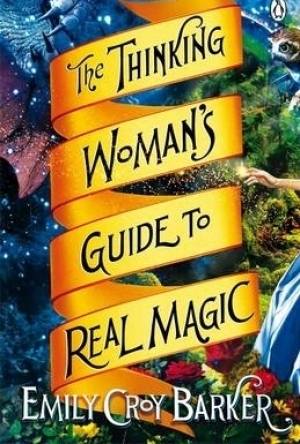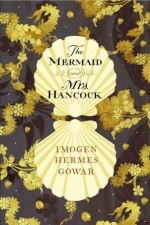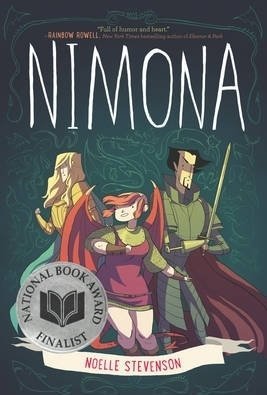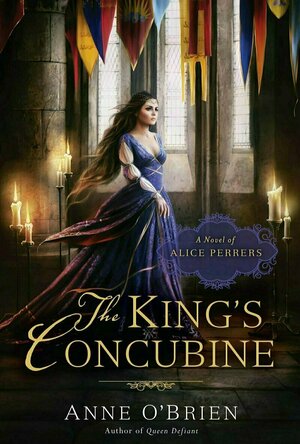Search
Search results
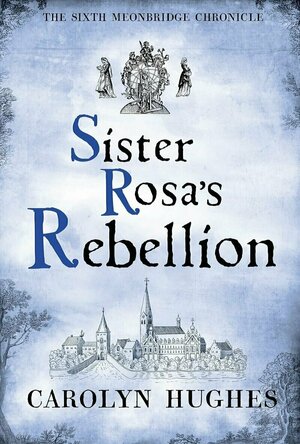
Sister Rosa's Rebellion (The Meonbridge Chronicles #6)
Book
How can you rescue what you hold most dear, when to do so you must break your vows? 1363. When...
Medieval Historical Fiction
Goddess in the Stacks (553 KP) rated The Thinking Woman's Guide to Real Magic in Books
Jan 12, 2018
This book is FANTASTIC. I was enthralled from start to finish, and frantically looked up the author to make sure she is writing a sequel. (She is, thank goodness!) I absolutely loved the main character, Nora, and the acerbic magician Aruendiel. Even while cheering for the opposite side, I even enjoyed reading about Raclin and Ilissa, the villains of the novel.
In Nora Fischer, we have a modern, independent, feminist woman transported to a place and time where women are inferior (by nature, most think.) There are even linguistic influences that make them inferior; women speak with a lot of "um" and "well" type words in their speech, while men don't. When Nora protests that this makes women's speech sound weaker, she's told that that's "just how women speak." Seeing her confronted with the sexism ingrained within the medieval style culture, and seeing her confront Aruendiel with how sexist it actually is, was a wonderful sub-plot of the book.
The main plot was well-paced and interesting - after being kidnapped by Ilissa at the beginning of the book, and enchanted into being a beautiful, love-struck little ninny, Nora recovers herself with the help of Aruendiel, and spends the rest of the book evading re-capture and finding her place in this new world. The descriptions are colorful, the characters are deep and fascinating, and the land and culture itself shows just how much thought went into creating this world. This is an absolutely spectacular debut novel, in my opinion, and I cannot WAIT for the sequel, since Barker did leave a few questions unanswered at the end of the book. I really can't rave about this book enough. If you like fantasy, (or Pride and Prejudice, since this book, while not attempting to be a retelling or anything, had a lot of the same feel) you should really pick this one up.
You can find all my reviews at http://goddessinthestacks.wordpress.com
In Nora Fischer, we have a modern, independent, feminist woman transported to a place and time where women are inferior (by nature, most think.) There are even linguistic influences that make them inferior; women speak with a lot of "um" and "well" type words in their speech, while men don't. When Nora protests that this makes women's speech sound weaker, she's told that that's "just how women speak." Seeing her confronted with the sexism ingrained within the medieval style culture, and seeing her confront Aruendiel with how sexist it actually is, was a wonderful sub-plot of the book.
The main plot was well-paced and interesting - after being kidnapped by Ilissa at the beginning of the book, and enchanted into being a beautiful, love-struck little ninny, Nora recovers herself with the help of Aruendiel, and spends the rest of the book evading re-capture and finding her place in this new world. The descriptions are colorful, the characters are deep and fascinating, and the land and culture itself shows just how much thought went into creating this world. This is an absolutely spectacular debut novel, in my opinion, and I cannot WAIT for the sequel, since Barker did leave a few questions unanswered at the end of the book. I really can't rave about this book enough. If you like fantasy, (or Pride and Prejudice, since this book, while not attempting to be a retelling or anything, had a lot of the same feel) you should really pick this one up.
You can find all my reviews at http://goddessinthestacks.wordpress.com
Olive (1 KP) rated The Mermaid and Mrs Hancock in Books
Jan 27, 2018
Stunning prose (2 more)
Enjoyable plot
Interesting characters
This is the best book I've read in months, it immediately made my list of favorites on Goodreads and I'm sure that I'm starting to annoy people with my raving about this book.
Visually the book is a stunner and one you can definitely judge by its cover. It's rare to find a historical fantasy where the fantasy aspect takes more of a backseat. I love both genres but this was a perfect balance between the two. The Regency London setting rather than Medieval or Victorian was really refreshing as was the use of mermaids rather than vampires/werewolves/zombies/magic. I've read a few reviews where people complain that the mermaids are prolific enough considering the title but I think this is only the case if you enter it anticipating the focus to be mermaids. It's definitely a consistent theme from start to finish but it doesn't take center stage until the very end. If you go in expecting mermaids galore, you might be a little disappointed.
A lot of historical fiction written after the time it portrays attempts to emulate the formal language of the time and usually with cringe-worthy results. This book is an exception. The prose is lightly reminiscent of a Jane Austen novel and beautifully descriptive but not overly so. The plot isn't one you can guess from the first page and while you can make educated guesses, the journey there is full of delightful twists and turns.
Really though I cannot say enough about this book. The only word that seems to come close is 'sumptuous'. It's the sort of book you can easily reread because the enjoyment doesn't hinge on shocking plot twists or mystery and suspense. It was a sheer joy to read and I dreaded the ending from the very first chapter. I almost never reread books but this is one I actually look forward to rereading.
Visually the book is a stunner and one you can definitely judge by its cover. It's rare to find a historical fantasy where the fantasy aspect takes more of a backseat. I love both genres but this was a perfect balance between the two. The Regency London setting rather than Medieval or Victorian was really refreshing as was the use of mermaids rather than vampires/werewolves/zombies/magic. I've read a few reviews where people complain that the mermaids are prolific enough considering the title but I think this is only the case if you enter it anticipating the focus to be mermaids. It's definitely a consistent theme from start to finish but it doesn't take center stage until the very end. If you go in expecting mermaids galore, you might be a little disappointed.
A lot of historical fiction written after the time it portrays attempts to emulate the formal language of the time and usually with cringe-worthy results. This book is an exception. The prose is lightly reminiscent of a Jane Austen novel and beautifully descriptive but not overly so. The plot isn't one you can guess from the first page and while you can make educated guesses, the journey there is full of delightful twists and turns.
Really though I cannot say enough about this book. The only word that seems to come close is 'sumptuous'. It's the sort of book you can easily reread because the enjoyment doesn't hinge on shocking plot twists or mystery and suspense. It was a sheer joy to read and I dreaded the ending from the very first chapter. I almost never reread books but this is one I actually look forward to rereading.
Ross (3284 KP) rated Age of Assassins in Books
Feb 5, 2018
Detective thriller in a medieval fantasy setting
I had heard great things about Age of Assassins and added it to my pile to read some time. But when NetGalley offered me the chance to review the follow-up Blood of Assassins before its release this month, it rocketed to the top of the pile.
I had no real expectations of this other than people rated it highly (which tends to make me more critical).
The premise was a little unusual for me - a detective thriller but in a fantasy setting. A young assassin in training, Girton, and his master are hired to find who hired another assassin to kill the heir to the throne. They then work undercover to determine who had the motive to kill the obnoxious heir. Girton becomes embedded within the squires and starts to see what a real childhood would have been like, growing up with other children rather than his master. His emotional frailty, alongside how hard he has to try not to kill them all and show how much more skilled he is than the bumbling, club-footed oaf he is presumed to be.
The plot itself is pretty much all revealed at the end with a Poirot-esque "I suppose you're wondering why I asked you all here" chapter, which I thought was a bit of a cop-out, more could have been hinted at along the way. Rather than the whole plot being revealed in a oner, people like to have enough to stitch it all together and I felt it maybe kept a little too much in the tank for the final scene.
I enjoyed it as a fantasy novel, though its scope was so much smaller than other books I have read recently, though the action scenes were well narrated.
As a detective novel, I thought it left a little too much of the reveal to the end and didn't reveal enough along the way.
I had no real expectations of this other than people rated it highly (which tends to make me more critical).
The premise was a little unusual for me - a detective thriller but in a fantasy setting. A young assassin in training, Girton, and his master are hired to find who hired another assassin to kill the heir to the throne. They then work undercover to determine who had the motive to kill the obnoxious heir. Girton becomes embedded within the squires and starts to see what a real childhood would have been like, growing up with other children rather than his master. His emotional frailty, alongside how hard he has to try not to kill them all and show how much more skilled he is than the bumbling, club-footed oaf he is presumed to be.
The plot itself is pretty much all revealed at the end with a Poirot-esque "I suppose you're wondering why I asked you all here" chapter, which I thought was a bit of a cop-out, more could have been hinted at along the way. Rather than the whole plot being revealed in a oner, people like to have enough to stitch it all together and I felt it maybe kept a little too much in the tank for the final scene.
I enjoyed it as a fantasy novel, though its scope was so much smaller than other books I have read recently, though the action scenes were well narrated.
As a detective novel, I thought it left a little too much of the reveal to the end and didn't reveal enough along the way.
This was a fun, quirky, and cute graphic novel that I absolutely adored.
The charm of it was split fifty-fifty between the writing and the drawings. I don't know why, but I am obsessed with the character drawings from this novel! They are so cute and amazing and I love them.
I love how it was so successful as a web comic that Harper decided to turn it into print. Things like that make me feel all warm and fuzzy inside.
This comic had me straight out laughing out loud (to the point where my roommates thought something had gone wrong with me). I loved how Nimona had so much spunk and actually *minor spoiler* was more villainous than the actual villain of the story.
Speaking of, the relationship between Nimona and Blackhart was awesome! It was cool to see the father-daughter relationship as well as the villain-sidekick and overall besties vibe from the pair.
Goldenlion was fun, too. Even though he was the :hero" of the story, he was still able to see the good in Blackhart and question the Institution and their motives and actions.
I liked how this isn't really just one genre. It has elements of fantasy, science/tech, and medieval genres but also had a very modern take on certain parts. I have always wanted to read something set in a distant time period that also has a lot of modern aspects.
The story line was cute, but it also got really deep at times. It allows readers to start questioning their own country's "heroes" and Institutions. It also calls into question how far testing and militarization should be allowed to go.
Overall, I really enjoyed this fun and very quick read.
If anyone is in a reading slump or just need to get into a better mood, I definitely recommend this to you.
The charm of it was split fifty-fifty between the writing and the drawings. I don't know why, but I am obsessed with the character drawings from this novel! They are so cute and amazing and I love them.
I love how it was so successful as a web comic that Harper decided to turn it into print. Things like that make me feel all warm and fuzzy inside.
This comic had me straight out laughing out loud (to the point where my roommates thought something had gone wrong with me). I loved how Nimona had so much spunk and actually *minor spoiler* was more villainous than the actual villain of the story.
Speaking of, the relationship between Nimona and Blackhart was awesome! It was cool to see the father-daughter relationship as well as the villain-sidekick and overall besties vibe from the pair.
Goldenlion was fun, too. Even though he was the :hero" of the story, he was still able to see the good in Blackhart and question the Institution and their motives and actions.
I liked how this isn't really just one genre. It has elements of fantasy, science/tech, and medieval genres but also had a very modern take on certain parts. I have always wanted to read something set in a distant time period that also has a lot of modern aspects.
The story line was cute, but it also got really deep at times. It allows readers to start questioning their own country's "heroes" and Institutions. It also calls into question how far testing and militarization should be allowed to go.
Overall, I really enjoyed this fun and very quick read.
If anyone is in a reading slump or just need to get into a better mood, I definitely recommend this to you.
Ross (3284 KP) rated Death March (Euphoria Online Book 1) in Books
Nov 19, 2018
Thrilling, compelling LitRPG
I am a massive fan of Phil Tucker's Chronicles of the Black Gate series and was intrigued at this venture, largely funded by kickstarter.
While the term "LitRPG" isn't necessarily something that would attract me (I've read and mostly enjoyed Ready Player One but the idea of people escaping the real world to enter an online one doesn't seem to justify a whole sub-genre to my mind).
The book sees Chris struggling to make ends meet teaching disinterested kids while he fights his brother's death sentence. A former compulsive gamer, given the chance to enter the world of Euphoria, normally too expensive for him to consider, he throws himself into the game with gusto. By playing on the hardest level (Death March), he is risking his own life as he cannot re-spawn in the game and death will mean actual death for him. The prize on offer for this risk, if he can survive 6 months game-time (the equivalent of a weekend in the real world), is a cash sum plus the chance to request anything at all of the AI running the government - including a pardon for his brother.
Chris finds himself in a ruined medieval setting in the game, struggling to earn points to level up and make his character stronger. This levelling up and earning/spending XP is a main part of the book. While not a RPG fan myself, I loved this aspect as it meant he learned new skills and abilities throughout the book with good reason (so no sudden new strengths here!) and he had to choose what kind of character he wanted to become.
The action sequences are sublimely written and narrated and the whole book is so immersive. Sadly, it is also really short so was over in no time, but with 2 more books already available I will get cracking on those.
Heartily recommend to anyone who is a fan of fantasy, gaming/RPG or anyone looking for some real escapism.
While the term "LitRPG" isn't necessarily something that would attract me (I've read and mostly enjoyed Ready Player One but the idea of people escaping the real world to enter an online one doesn't seem to justify a whole sub-genre to my mind).
The book sees Chris struggling to make ends meet teaching disinterested kids while he fights his brother's death sentence. A former compulsive gamer, given the chance to enter the world of Euphoria, normally too expensive for him to consider, he throws himself into the game with gusto. By playing on the hardest level (Death March), he is risking his own life as he cannot re-spawn in the game and death will mean actual death for him. The prize on offer for this risk, if he can survive 6 months game-time (the equivalent of a weekend in the real world), is a cash sum plus the chance to request anything at all of the AI running the government - including a pardon for his brother.
Chris finds himself in a ruined medieval setting in the game, struggling to earn points to level up and make his character stronger. This levelling up and earning/spending XP is a main part of the book. While not a RPG fan myself, I loved this aspect as it meant he learned new skills and abilities throughout the book with good reason (so no sudden new strengths here!) and he had to choose what kind of character he wanted to become.
The action sequences are sublimely written and narrated and the whole book is so immersive. Sadly, it is also really short so was over in no time, but with 2 more books already available I will get cracking on those.
Heartily recommend to anyone who is a fan of fantasy, gaming/RPG or anyone looking for some real escapism.
ClareR (6062 KP) rated The Battle For England: Women at war in Medieval England (Wars of the Magna Carta #1) in Books
Jan 22, 2019 (Updated Jan 22, 2019)
Women in medieval England
This is a book packed with history, told from the points of view of a priest, a female castellan, a female Keeper of the Kings Forest and a Knight (he gets about a chapter). It must have been very unusual for there to be female Castellans and Keepers of the Forest in a time where a womans primary function was to get married and give birth to sons who could inherit a title. The women in this story seem to have to prove themselves constantly to outsiders - the people who live under their rule don't need to see the proof, they have experience of how good these two women are at their jobs.
The years after the Magna Carta was signed were very unsettled. King John had problems with Phillip of France, losing lands in France and allowing the French in to England to take over castles and land by force. With the death of John, his 9 year old son succeeds him and William Marshall becomes his Regent. I have read other books about William Marshall, and what I read here seemed to be in keeping (most writers seem to be in agreement at the kind of man he must have been).
Nicolaa of Lincoln and Matilda of Laxton were not weak females. I really liked how they were portrayed, and I enjoyed reading the chapters from their points of view as it showed how strong and independent they were. I really liked Father Barnards chapters too. It gave an objective look at how these two women reacted in their situations.
I am a real sucker for historical fiction, and I feel that this was a really well researched novel. There was nothing overly sensationalised, which made it more believable for me. I will probably read the next book in this series. I'm interested to see if there is more from these two impressive women.
Many thanks to Sapere Books for a copy of this book to read and review.
The years after the Magna Carta was signed were very unsettled. King John had problems with Phillip of France, losing lands in France and allowing the French in to England to take over castles and land by force. With the death of John, his 9 year old son succeeds him and William Marshall becomes his Regent. I have read other books about William Marshall, and what I read here seemed to be in keeping (most writers seem to be in agreement at the kind of man he must have been).
Nicolaa of Lincoln and Matilda of Laxton were not weak females. I really liked how they were portrayed, and I enjoyed reading the chapters from their points of view as it showed how strong and independent they were. I really liked Father Barnards chapters too. It gave an objective look at how these two women reacted in their situations.
I am a real sucker for historical fiction, and I feel that this was a really well researched novel. There was nothing overly sensationalised, which made it more believable for me. I will probably read the next book in this series. I'm interested to see if there is more from these two impressive women.
Many thanks to Sapere Books for a copy of this book to read and review.
Deborah (162 KP) rated The King's Concubine in Books
Dec 21, 2018
This is the second novel by Anne O'Brien that I have read recently, and I have enjoyed them both. Although both novels were written in the first person, a narrative technique that I usually don't like as it is difficult for authors to pull off, I have found O'Brien's writing convincing and applaud her for this.
The protagonist of this particular novel is Alice Perrers, best known as mistress to Edward III. Not an awful lot, it seems, is really known about Alice, at least before her time at court. O'Brien has used known facts and woven her story about these, filling in the gaps with imagination and probability. Historically, Alice Perrers has never come across as a particularly nice person, seeming to be greedy, grasping and manipulative. O'Brien doesn't do a total whitewash job on her, but she does give a more sympathetic portrayal. Her Alice is still keen to acquire land holdings, but seen as a woman who has come from practically nothing and can see what her future might be without royal patronage, it is difficult to really blame her. History has always tended to be written by the victors and by men, and in medieval times they would not have liked a woman stepping out of her 'place' so it is quite understandable that Alice Perrers should have been so vilified.
Overall, I thought this was a good read. I read Vannora Bennett's The People's Queen a while back, which is also about Alice Perrers (she seems to be enjoying something of a renaissance!) but I preferred O'Brien's book. The cover gives O'Brien a plaudit of being 'better than Philippa Gregory'. Well, I can't argue with that as I haven't cared much for either of the books by Gregory that I have read, so I will wholeheartedly agree that O'Brien is much more worth reading! I look forward to her book on Eleanor of Aquitaine.
The protagonist of this particular novel is Alice Perrers, best known as mistress to Edward III. Not an awful lot, it seems, is really known about Alice, at least before her time at court. O'Brien has used known facts and woven her story about these, filling in the gaps with imagination and probability. Historically, Alice Perrers has never come across as a particularly nice person, seeming to be greedy, grasping and manipulative. O'Brien doesn't do a total whitewash job on her, but she does give a more sympathetic portrayal. Her Alice is still keen to acquire land holdings, but seen as a woman who has come from practically nothing and can see what her future might be without royal patronage, it is difficult to really blame her. History has always tended to be written by the victors and by men, and in medieval times they would not have liked a woman stepping out of her 'place' so it is quite understandable that Alice Perrers should have been so vilified.
Overall, I thought this was a good read. I read Vannora Bennett's The People's Queen a while back, which is also about Alice Perrers (she seems to be enjoying something of a renaissance!) but I preferred O'Brien's book. The cover gives O'Brien a plaudit of being 'better than Philippa Gregory'. Well, I can't argue with that as I haven't cared much for either of the books by Gregory that I have read, so I will wholeheartedly agree that O'Brien is much more worth reading! I look forward to her book on Eleanor of Aquitaine.
TC
Thomas Cranmer: A Life
Book
Thomas Cranmer, the architect of the Anglican Book of Common Prayer, was the archbishop of...

Bombing Hitler: The Story of the Man Who Almost Assassinated the Fuhrer
Hellmut G. Haasis and William Odom
Book
Georg Elser was just a working-class citizen living in Munich, Germany. He was employed as a...
